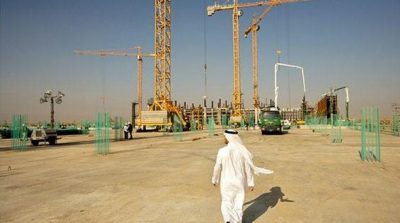NOVANEWS

Assistant Professor of History at Georgetown University Abdullah Al-Arian has written an epic tweetstorm showing that the “paper of record” has long pretended that the leaders of our close “friends” (cough … radical head-choppers) the Saudis are on the verge of becoming “moderate”:
.
This piece from 1953 describes King Saud as “more progressive and international-minded than his autocratic father” pic.twitter.com/U8ZFLNX0Ko
This piece from 1953 describes King Saud as “more progressive and international-minded than his autocratic father” pic.twitter.com/U8ZFLNX0Ko
This piece from 1957 doesn’t refer to Saudi Arabia specifically but it’s an epic headline nevertheless. pic.twitter.com/Gj6NB1DRtq
1960: “King Saud has increasingly assumed the role of liberal champion of constitutional reform.” (The Saudi constitution was adopted by royal decree in 1992). pic.twitter.com/3kwGcgnpDd
1962: “The Oil Genie and the Sheikh” offers a tour of Gulf palaces that marvels at their “gilded furniture of impressive ugliness.” pic.twitter.com/EcFqhUpayE
This article describes Kuwait and not Saudi Arabia. They’re very similar, yet very different, especially when it comes to democratic rights.
The rest of the article (not included here) provides descriptions from several other Gulf states. Here is part of the photo spread from Oman and Bahrain with the caption “‘heaven on earth”—air conditioned palaces, Cadillacs, girls” pic.twitter.com/j6p7LiMmZt
During the so-called “Arab Cold War” Saudi royals were supported as a bulwark against Nasserism. This 1963 piece celebrates Crown Prince Faisal’s “burst of social reform and economic development.” pic.twitter.com/OR6g73Zveh
1964: “He is a man who has gained nearly absolute power without really wanting it.” pic.twitter.com/QYzWOKyzpE
1964: “He is a man who has gained nearly absolute power without really wanting it.” pic.twitter.com/QYzWOKyzpE
Here Faisal is described as “ascetic, with only one wife, who lives on grilled meat and boiled vegetables and makes a fetish of moderation.” pic.twitter.com/SSQV0s822i
This 1975 obituary: “Faisal, Rich and Powerful, Led Saudis Into 20th Century“ pic.twitter.com/2YZm2O3M3A
A couple of more headlines from 1975, including one on “planting the seeds of a parliamentary system in the kingdom.” pic.twitter.com/TlwWu1vLYv
An epic lede here from 1979: “His black Trans-Am sports car creeps along the Corniche Road on the edge of the Red Sea. To the left, skyscrapers jab into the humid air, a sight made more impressive by the desolation surrounding the ancient city of Jidda.”
pic.twitter.com/0ljqekE2YN
1982: “King Fahd has been depicted as the leading figure in a progressive, modernizing faction within the tradition-minded monarchy.” pic.twitter.com/lPPFWrW0QA
1991-92: “major political changes,” “modernizers,” “governmental reform,” “and other political reforms” pic.twitter.com/0gRSPLSkjm
1992: “In making the changes, King Fahd is following previous generations of Saudi rulers who had also moved toward modernization since King Abdelaziz united a vast territory populated by feuding tribal leaders into the Kingdom of Saudi Arabia 60 years ago.” pic.twitter.com/3NXCn6oo54
1996: Friedman makes his first appearance, describing King Fahd as a “bulldozer” in tackling political problems on behalf of his US ally. pic.twitter.com/DoYcoyVxrE
2002: Friedman opines about the “2 futures” for Saudi Arabia, concluding “Which school would I bet on? Ask me in five years.” pic.twitter.com/msVsLawvKl
Luckily, we wouldn’t have to wait that long. On eve of Iraq invasion Friedman makes the case that war “could drive reform in the Arab/Muslim world” pic.twitter.com/ML6IfkE4uo
2005: “For Abdullah, who has fashioned himself as a reformer in a land where conforming to tradition is a virtue, the challenge now is to make good on longstanding promises for change.” pic.twitter.com/NlZWDWRphp
“More generally, the reform agenda has drawn momentum from King Abdullah’s personal popularity…” pic.twitter.com/Q0LrjTUPtm
“Yet by the Saudi’s premodern standards, the 85 year-old King Abdullah, with a harem of wives, is a social revolutionary.” pic.twitter.com/zQ2tAj1p9L
Saudi society is divided, but the monarch’s sympathies lie with the reformers. pic.twitter.com/x1siP4RnL6
From 2012: “King Faisal, in a rush to modernize his realm, created Saudi state television in the 1960s, and that bold step is widely believed to have led to his assassination” pic.twitter.com/ZZgrTLXi1y
Reporting from the front lines of the Arab uprisings in Dubai, Friedman calls Saudi King Abdullah “a real progressive” pic.twitter.com/Qf6bWuJUv6
King Abdullah’s 2015 obituary describes him as “…a cautious reformer amid great changes in the Middle East.” pic.twitter.com/urrdKRvkbk
Saudi Arabia’s economic revolution offers “tantalizing hints at even broader reforms.”
pic.twitter.com/lJEKbhrHcD
From earlier this month, this Friedman piece includes such gems as “he is much more McKinsey than Wahhabi — much more a numbers cruncher than a Quran thumper.” pic.twitter.com/g6pkppqmQi
And finally, the one that inspired it all, a hagiographic ode to royal reform that represents seven decades of strategic policy objectives barely concealed beneath recycled cultural tropes. pic.twitter.com/DQHeftCxnz
























































